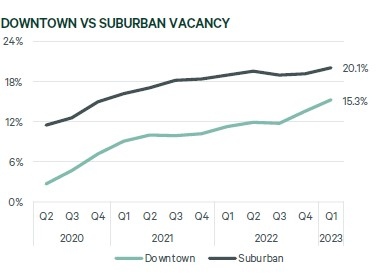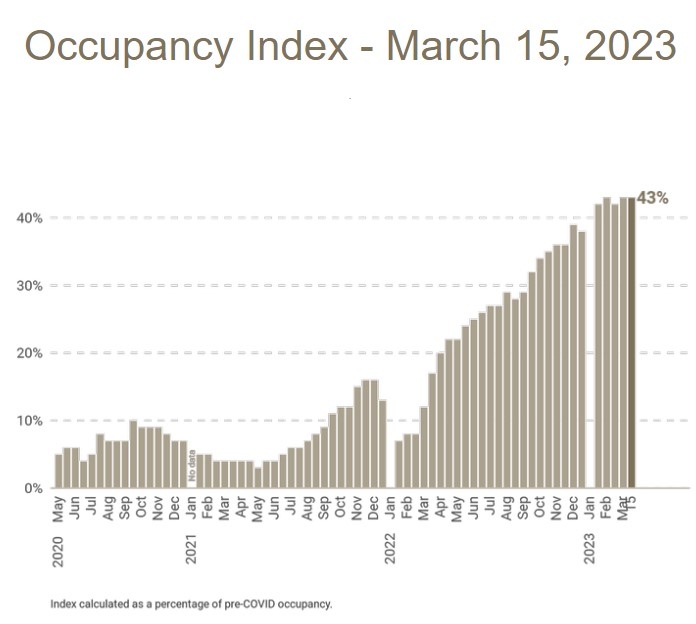'Once-in-a-generation' shift to remote working leads to record vacancy in Toronto offices
The number of vacant office spaces in downtown Toronto has reached a level unseen in 28 years as the sector goes through a “once-in-a-generation evolution,” according to a new report.
CBRE Limited, the commercial real estate services giant, released the data in their Q1 2023 Canada Office Figures report, which said the vacancy rate in the city’s core rose to 15.3 per cent in the first quarter – the highest it’s been since 1995.
- Download our app to get local alerts on your device
- Get the latest local updates right to your inbox
The numbers are being driven by what CBRE describes as companies continuing to adjust to hybrid work models and office landlords “striving to maintain their appeal.”
“The result is a sector in flux and greater separation forming between uninspired older offices and well-amenitized modern spaces,” a news release issued Tuesday read.
Despite the vacancies, the data also showed office space has continued to reopen in the downtown core since 2022 with a strong demand in the legal, finance, insurance, and real estate sectors because of their traditional working arrangements and gradual return-to-office directives.
However, CBRE said it has observed a “muted activity” across most other industries and that downsizing, specifically in the tech sector, has contributed to a high rate of vacancy.
“Demand for cheap commodity space has evaporated and been replaced with the want for spaces that act as conductors for business productivity and development,” chairman of CBRE Canada Paul Morassutti said following the release of the report.
 CBRE's downtown and suburban office vacancy rates are seen here. (CBRE)“There is a greater focus on higher-quality and highly amenitized office assets as companies learn that remote and in real life are not binary choices, but in fact each reinforces the other.”
CBRE's downtown and suburban office vacancy rates are seen here. (CBRE)“There is a greater focus on higher-quality and highly amenitized office assets as companies learn that remote and in real life are not binary choices, but in fact each reinforces the other.”
According to the Strategic Regional Research Alliance, which tracks office occupancy data across public, private and institutional sectors in Toronto, the occupancy rate in the city is hovering just above 40 per cent (comapred to pre-COVID-19) since the beginning of the year as companies “work their way through the implementation of the hybrid model.”
In their most recent report, the group, which sources its data from the City of Toronto and its various BIAs, claimed CEOs are reporting that remote work is “particularly harmful for youth career pathing largely because senior experienced employees are staying home at an alarming rate reducing opportunities for in-person mentoring and collaboration.” The latest office occupancy data from the Strategic Regional Research Alliance is seen in this image. (SRRA)
The latest office occupancy data from the Strategic Regional Research Alliance is seen in this image. (SRRA)
Outside of Toronto, Montreal and Ottawa both recorded their highest-ever office vacancy rates at 16.5 and 13.2 per cent, respectively. Vancouver saw their vacancy rate rise to 10.4 per cent, a level unseen since 2004.
At a national level, Canada’s office vacancy rate is at an all-time high of 17.7 per cent.
In fact, the CBRE says 10 of the last 12 quarters produced negative net absorption, which means more office space was on the market than was leased by businesses.
 Signage displaying office spaces for lease hangs from a building in Toronto's Liberty Village on Tuesday, March 9, 2021. THE CANADIAN PRESS/Tijana Martin
Signage displaying office spaces for lease hangs from a building in Toronto's Liberty Village on Tuesday, March 9, 2021. THE CANADIAN PRESS/Tijana Martin
'THERE’S AN OPPORTUNITY HERE’: ONTARIO REAL ESTATE ASSOCIATION HEAD
On Tuesday, Tim Hudak, CEO of the Ontario Real Estate Association, told CP24 the vacancies could actually boost Toronto’s low housing supply.
“There is an opportunity here. While some business won’t have their staff in the office every day of the week, there’s opportunity for residences,” Hudak said. “I think the province of Ontario, working with the city, should look at where we can convert some of that commercial space into affordable homes for young Canadians or mixed-use residential and commercial.”
Hudak pointed to places like Calgary, where cities have teamed up with the province and businesses, to maximize vacant office space and provide more housing options to those looking to buy their first property.
“Hopefully, this mayor’s race coming up in Toronto to lay some ideas on the table to create residences that can help first-time home buyers get into the market,” he said.
CTVNews.ca Top Stories

Read Trudeau's Christmas message
Prime Minister Justin Trudeau issued his Christmas message on Tuesday. Here is his message in full.
Stunning photos show lava erupting from Hawaii's Kilauea volcano
One of the world's most active volcanoes spewed lava into the air for a second straight day on Tuesday.
Richard Perry, record producer behind 'You're So Vain' and other hits, dies at 82
Richard Perry, a hitmaking record producer with a flair for both standards and contemporary sounds whose many successes included Carly Simon’s 'You’re So Vain,' Rod Stewart’s 'The Great American Songbook' series and a Ringo Starr album featuring all four Beatles, died Tuesday. He was 82.
What is flagpoling? A new ban on the practice is starting to take effect
Immigration measures announced as part of Canada's border response to president-elect Donald Trump's 25 per cent tariff threat are starting to be implemented, beginning with a ban on what's known as 'flagpoling.'
Hong Kong police issue arrest warrants and bounties for six activists including two Canadians
Hong Kong police on Tuesday announced a fresh round of arrest warrants for six activists based overseas, with bounties set at $1 million Hong Kong dollars for information leading to their arrests.
Dismiss Trump taunts, expert says after 'churlish' social media posts about Canada
U.S. president-elect Donald Trump and those in his corner continue to send out strong messages about Canada.
Indigenous family faced discrimination in North Bay, Ont., when they were kicked off transit bus
Ontario's Human Rights Tribunal has awarded members of an Indigenous family in North Bay $15,000 each after it ruled they were victims of discrimination.
Heavy travel day starts with brief grounding of all American Airlines flights
American Airlines briefly grounded flights nationwide Tuesday because of a technical problem just as the Christmas travel season kicked into overdrive and winter weather threatened more potential problems for those planning to fly or drive.
King Charles III is set to focus on healthcare workers in his traditional Christmas message
King Charles III is expected to use his annual Christmas message to highlight health workers, at the end of a year in which both he and the Princess of Wales were diagnosed with cancer.
































